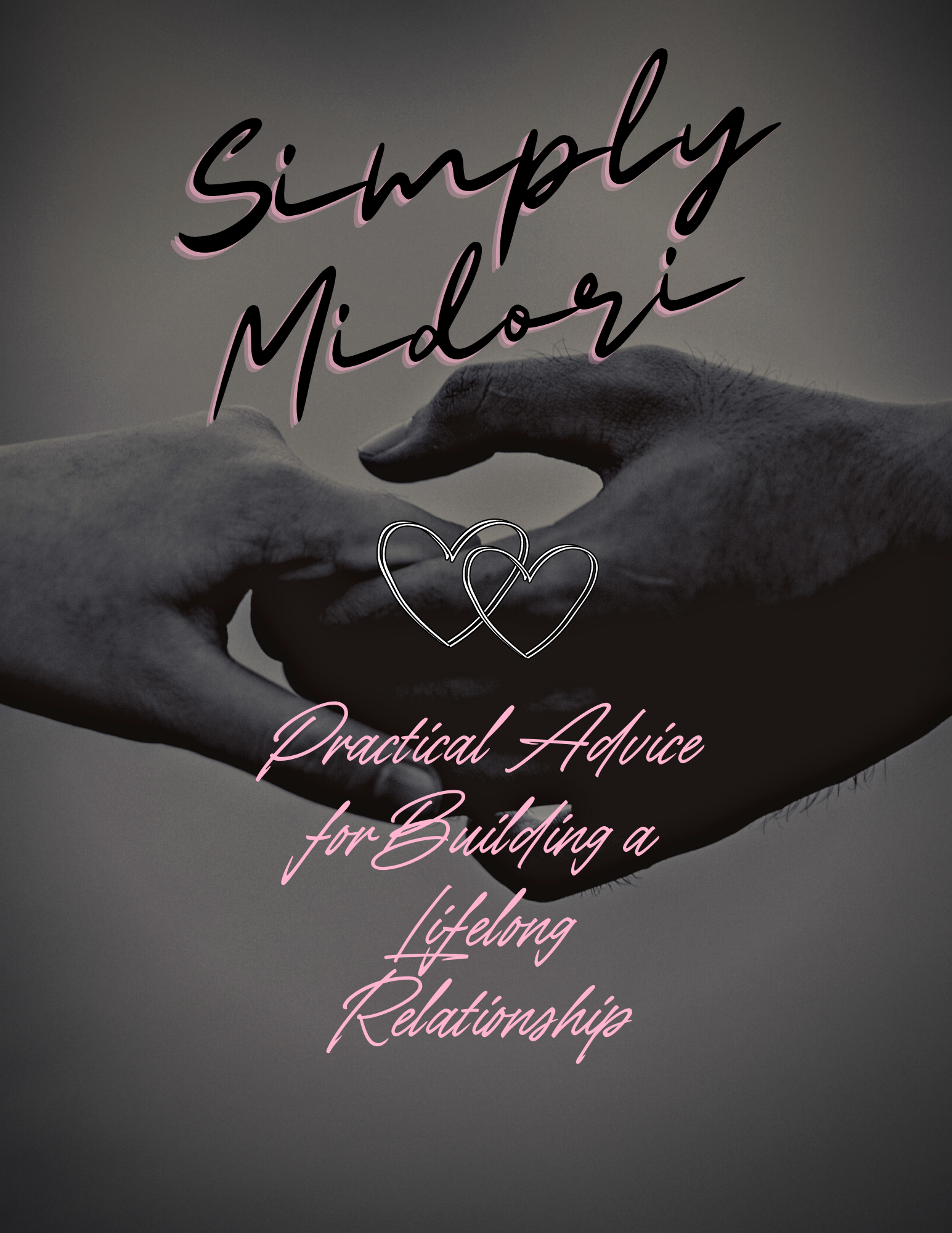Traditionally marriage is what comes next in most relationships. You meet someone, date, fall in love, and plan for the big day. Amid the excitement of planning for wedded bliss comes the daunting reality couples face when dealing with two different lives coming together – habits and belongings all needing to coexist peacefully!
Unfortunately, conditions aren’t always so harmonious; divorce has become an accepted solution despite its once-taboo status.
If you are currently married, there is a 40-50% chance that you will divorce. But don’t give up yet: the other side means half or more marriages make it through these “tough” periods and long past them into happily ever after – if both partners are willing to strive for that outcome!
@ Simply Midori, we want you to be in the 50-60%, and here are five ways to do just that.
1. Put your spouse at the top of your list
What list? All lists? All other commitments in life should take a back seat to ensure that you and your partner are nurturing and growing together. Quality time, free from work or children’s demands, is essential for maintaining a solid marriage.
2. Set boundaries
When I hear the word boundaries, I think of restrictions and limits. In marriage, I have learned that establishing boundaries is integral to ensuring a healthy, supportive relationship. They provide the structure to express individual needs and values without compromising those of your partner – allowing for more freedom within the union.
Everyone has unique limits that reflect their core values, beliefs, and what they need to feel cherished. Boundaries come in all shapes and sizes – from the small daily matters we set for ourselves to huge decisions requiring much thought. Acknowledging these boundaries is important since it serves as an outward expression of our innermost needs!
Establishing clear rules from the beginning can help strengthen a couple’s bond. Here are some common boundary topics amongst marriages:
-
Visiting in-laws
-
Holiday plans
-
How in-laws talk or address the daughter or son in law
-
Fidelity
-
Relationships with the opposite sex
-
Messaging the opposite sex
-
Time needed to work out or perform different hobbies
-
Not hiding money or debt from each other
Of course, understanding what a boundary looks like is one part of the puzzle; the next step is figuring out how to set effective boundaries for your marriage.
Ways to Set and Respect Boundaries With Your Spouse:
-
Communication is key to establishing healthy boundaries in any relationship, especially with your spouse. Think carefully about what matters most and outline those areas that are non-negotiable for you as a couple–but remain open to compromise on issues that carry less weight. Be sure to express yourself clearly when discussing these boundaries — it can make all the difference between successful negotiation and discord!
-
Establishing consequences is instrumental in maintaining healthy boundaries. If you and your partner agree to a boundary, such as not raising voices during a conflict, ensure it’s respected by putting the consequence of violated boundaries into action – for example, taking a 30-minute walk alone after someone has yelled during an argument. Following through on these outcomes will demonstrate respect for yourself and each other–after all, if you don’t take your own agreement seriously, why should anyone else?
-
Owning up to your own words and actions. Everything we do and say has far-reaching negative and positive effects. For instance, criticizing someone can distance them, while kind communication allows healthy closeness to develop. Remember: the choices you make now will have repercussions that go beyond mere momentary responses. Own up to what you do and say to ensure that those adverse effects do not linger.
Honor your partner’s boundaries. Recognize that what you say and do (or don’t do) impacts your partner. Understand that you may slip up; in those instances, take responsibility, offer a genuine apology, and circle back to clear communication.
3. Be honest with each other
If you want your relationship to last, make sure honesty is the foundation. Create a space where both partners feel comfortable sharing their feelings – no matter what – without fear of being judged.
Honesty is essential in any relationship, both for the significant and insignificant aspects. It means constantly communicating truthfully with your partner – no lies, pretenses, or omissions of information – to maintain your trust. Additionally, honesty allows key issues within the partnership to be addressed directly instead of hiding them from the discussion, leading to more meaningful connections and conversations.
Being honest means being your true self around your partner, never hiding who you are, what you think, or how you feel.
Honesty is always the best policy!
When it comes to relationships, never underestimate the power of honesty! Being open and honest with your partner creates an unbreakable bond between you. On the other hand, each lie not only erodes trust—it can turn a trusting partnership into adversaries over time.
4. Develop conflict resolution skills
Confronting disagreements doesn’t have to mean disaster – conflict can bring growth, understanding, and improved communication. Develop the skills required for healthy resolution of disputes and watch relationships move from stuck points to progress toward each partner’s desired outcome without resentment!
Every relationship is bound to experience friction at one point or another. Though disagreements are natural, how a couple resolves them can determine the partnership’s long-term success. A resolution should be reached with respect for each party’s feelings to protect the intimacy and trust while preventing further alienation between partners.
Clinical psychologist Russell Grieger (2015) suggests that disagreements have three possible outcomes:
1. The outcome is good for one but not the other. A win–lose scenario means one person gets what they want while the other is left crushed, possibly feeling hurt, angry, resentful (or fill in the blank). These feelings lead to further disagreements or surface in other areas of the relationship.
2. The outcome is destructive for both people. A lose-lose happens when both sides want the other to ‘win,’ so neither will give in. The scenario damages the relationship, and if it continues, the relationship becomes toxic (Amber Heard & Johnny Depp, anyone).
3. Appropriate resolution for both. The couple found and worked toward an equally beneficial solution to achieve a win–win outcome. Neither person leaves feeling defeated or damaged, which increases confidence and trust in the relationship.
Undoubtedly, the third option is ideal for a long-term, healthy partnership, avoiding the potential downward spiral in the relationship. In response to conflict, a win–win outcome leads to growth and progress.
5. Get Help.
Relationships take hard work, and getting help from a professional can be beneficial when issues arise. Marriage therapy is an effective tool for couples looking to improve their partnership in specific ways, such as increasing communication or trust.
When choosing the right therapist for your relationship, selecting someone with whom both partners feel comfortable is just as important as picking out a therapeutic approach – so don’t hesitate to reach out!
Common types of marriage therapy:
SOLUTION-FOCUSED THERAPY
Solution-focused therapy offers spouses a path to create lasting, positive change. With the help of their therapist, couples can define what they want and need to work together towards achieving it, an effective plan when working through specific problems or issues that plague the relationship.
NARRATIVE THERAPY
Narrative therapy is an evidence-based approach to understanding and improving relationships. This technique fosters better communication between spouses by helping them recognize when their self-defeating narratives are hurting the marriage, then working together with guidance from a therapist to craft positive new stories that foster greater intimate connections.
IMAGO RELATIONSHIP THERAPY
The Imago therapy method highlights childhood wounds and unmet needs to foster understanding between spouses through mirroring, concern, validation, and empathy. The ultimate goal is resolution – consciously addressing these issues helps couples quickly identify negative behaviors stemming from their past experiences. This therapeutic approach can bring about profound healing for both partners by breaking down the walls built up over time due to unresolved pain points or sensitivities resulting from troubles with early attachments.
EMOTION-FOCUSED THERAPY
A marriage therapist can help spouses break through problematic patterns in their relationship by delving into the deeper emotions behind them. It may seem impossible to access what lies beneath these reactions when carried away with apathy, resentment, or anger, but that’s where a trained therapist is an invaluable resource. Through such exploration, couples can identify and examine underlying feelings of fear, hurt, and sadness, uncovering unmet needs revealed by stronger emotional connections and providing understanding between one another – making for healthier relationships all around!
DISCERNMENT COUNSELING
In 2008, a groundbreaking technique was developed to help married couples make crucial decisions about their relationship. This short-term therapy approach allows couples to move past uncertainty and ambivalence to explore all available options for the future of their marriage. The critical outcome of discernment counseling is deciding what’s best for each spouse before facing an irreversible commitment.
Conclusion
It’s important for couples to stay intentional in order for their marriages to last for the long haul. Taking steps such as prioritizing their marriage, setting boundaries, being honest with each other, learning conflict resolution skills and seeking help when needed can be key to ensuring divorce is not an option. Doing these things can take time and effort but they are worth it in order to have a healthy, lasting relationship.















